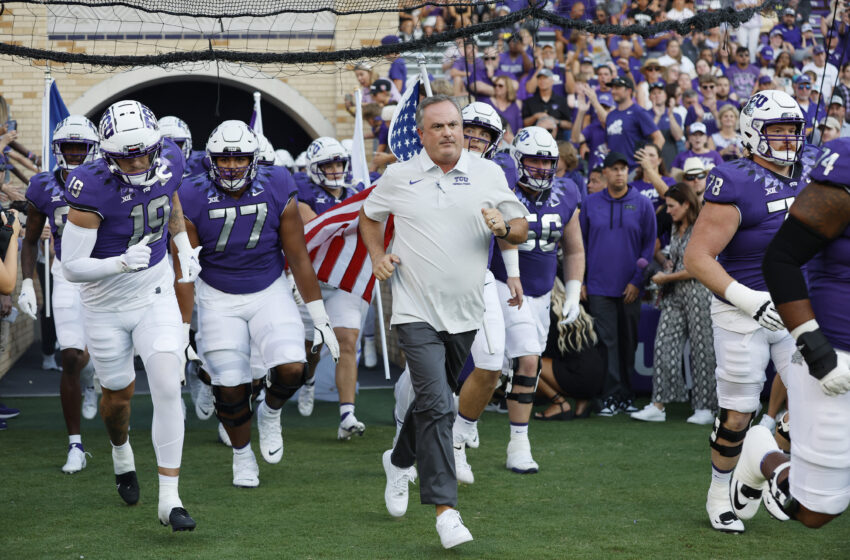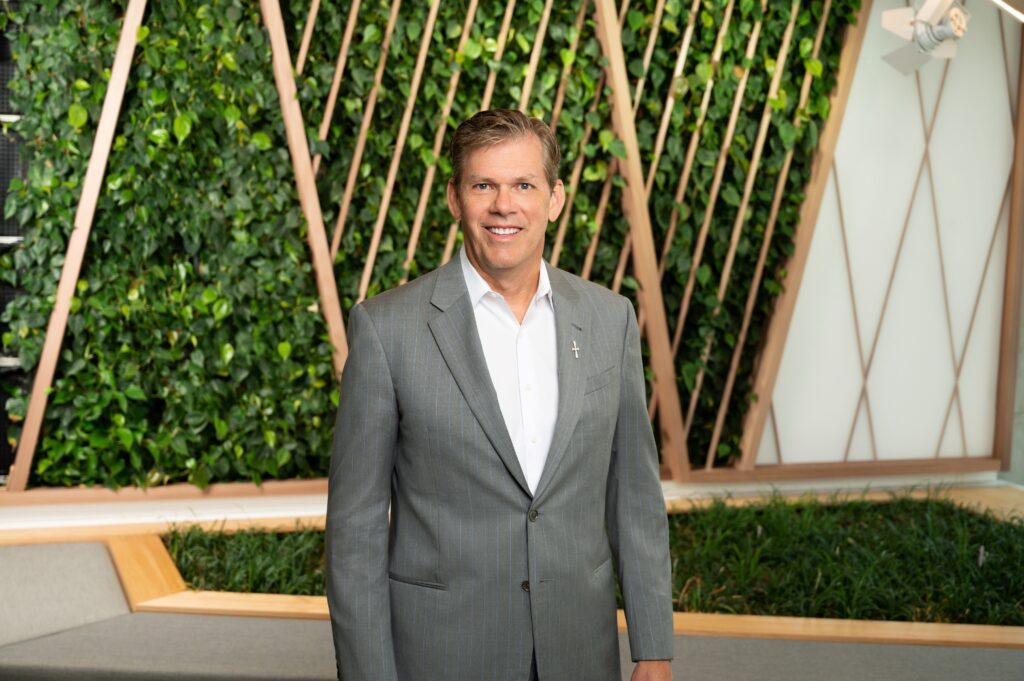Building A Championship Culture
- August 29, 2023

The Rapid Rise and Leadership Insights of Sonny Dykes at TCU
When Sonny Dykes took on the head football coaching job at Louisiana Tech in 2010, he urged patience from Bulldogs fans. His system would take a while to get going, he explained, but it would work.
Sure enough, the Bulldogs improved steadily each of the three years of his tenure. By 2012, Dykes had led the team to a 9-3 record, its best showing since 1997. This slow-but-sure progress was a pattern Dykes would repeat in his next two head coaching jobs, at California and Southern Methodist University.
“At Cal, we were really bad my first year,” Dykes recalls. “One win the first year, then five the second. At SMU, it was five wins the first year, then 10 the second.”
So in 2021, when Dykes moved across the Metroplex from Dallas’s SMU to Fort Worth’s Texas Christian University, most onlookers figured it would take a year or two for the real magic to happen.
But this time, there was no wait. Success came much quicker.
Under Dykes, the TCU Horned Frogs saw a historic 2022 season. The team had no losses in the regular season, earning a perfect 12–0 record. Despite a loss to Kansas State in the Big 12 championship game, TCU went on to make the College Football Playoff National Championship game—the first Big 12 team to do so in the CFP era—before falling to national champion Georgia and ending the season ranked No. 2. Dykes won 10 National Coach of the Year awards that year.
“I’m not quite sure why it happened so fast,” Dykes says. “It usually takes a little longer. I think it was a combination of our teaching methods and the personalities on the team.”
Born in Big Spring, Texas, Dykes is the youngest son of college football coaching legend Spike Dykes, who served as head coach of the Texas Tech Red Raiders from 1986 to 1999 and took the team to seven bowl games. Sonny was inspired by his father early on but initially opted for baseball over football. He graduated in 1993 from Texas Tech, where he lettered as a first baseman.
This is one aspect of Dykes’ football coaching career that makes him a little unusual. Another is his pedigree, working under the eccentric, innovative Mike Leach at Kentucky and Texas Tech. Leach, who passed away in December 2022, was known for his transformational “Air Raid” offense (you can read more about Leach in “Catching the Perfect Pass” in the Q1 2020 issue of Texas CEO Magazine). Dykes credits Leach not only for much of his own success but also with changing how the game of football is played.
“Mike was totally authentic and an outside-the-box thinker,” Dykes says. Leach, who once taught a college course called “Leadership Lessons in Insurgent Warfare and Football Strategies,” took an unconventional and somewhat cerebral approach to the game that clearly influenced Dykes. In that way, Dykes is something of a new model of football coach: a professional, a systems thinker, someone as interested in working smart as in working hard.
If that sounds a little like an ideal CEO to you, you’re not far off. In our discussion with Dykes, he often makes parallels to the world of business. Read on for some of his insights from his career so far—many of which translate from the gridiron to the office.
Your first year at TCU was phenomenal right out of the gate. How did it happen so quickly this time around?
Typically, it does take a little time to get your system put in and to get the buy-in of the players. For whatever reason, this team seemed to grasp the concepts we teach faster than any team that I’ve ever been around.
The approach that we took from day one was “Here’s our plan and here’s how it’s going to benefit you individually and all of us collectively.” I’m a big believer in explaining why something is important, whether it’s your athletic team, your employees, whomever. I even have this conversation with my daughters all the time: Why is this important? Why does it matter if you do well in eighth-grade science class?
At TCU, we kept emphasizing why certain actions were important, and to their credit, the players listened. They started to see why it was important for them to get good sleep, to really take care of their nutrition and supplementation—all those things. The buy-in was really good.
We were fortunate to have some success early on in the season. We passed a big test when we won against Oklahoma. Then we got down 17 to Oklahoma State, but our players never panicked. Our guys rallied, and we kept working the plan we’d talked about being so important. And we came back and won. We kept our heads down, believed in ourselves, believed in our teammates, and didn’t try to do too much.
One thing we talked about all the time that year was “do your job.” Everybody on this team has a very specific job. Some are viewed as really important and others as not as important, but they’re all critical to success. That was the secret for us. Fortunately, we never got distracted. The players showed up every day and did their job.
You talk about a few things that might surprise some people—things like mental health, nutrition, sleep. These are fairly new ideas in the college coaching world, right?
Yes, and I think that excited our players—the idea that we’re going to take advantage of every trend and all the cutting-edge technology. We are going to grab every inch we can, whether it’s in nutrition or recovery or supplementation or mental health or the scheme. You keep grabbing these inches and then all of a sudden you look up and you’ve got a couple of feet. That approach became who we are as an organization.
Our challenge now is how to move forward. Because last year’s success doesn’t have anything to do with our future. We have to make sure we wake up every morning with the same desire to improve on last year.
Last season, you lost your starting quarterback in the first game. What went through your head when that happened?
I’d been coaching for 24 consecutive seasons and our starting quarterback had never missed a start. Then our quarterback [Chandler Morris] injures his knee in the third quarter of the first game. We were fortunate to have a replacement in Max Duggan. Max had lost a quarterback competition after three years as a starter, but we all had a lot of confidence that he would step up.
Max never blinked. He just kept showing up, kept working hard. Fortunately for us and for him, he was ready. When Chandler got hurt, Max stepped in and picked up where Chandler left off and elevated our program. Max ended up finishing second in the Heisman trophy balloting. A year and half ago, he probably thought he was going to be in the corporate world, and now he’s been drafted by the Chargers.
The change in the environment in college football is interesting. Now an athlete can decide they don’t want to play for you anymore and just transfer. I assume that free-agent approach has dramatically changed the way you have to treat players.
It is different. It used to be that once you recruited a player, they were at your mercy. But I never really saw it that way. I saw, still see it, as everyone being in this together. My role as a coach is to push you and to get you to do things that are sometimes uncomfortable. Your role is to let us know what we can do better to put you in a situation to succeed. If we don’t play well on Saturday, it’s not the player’s fault; it’s our fault, because we’re all in it together. When you have that way of thinking, everybody is more motivated and will do everything they can to support each other.
If the players believe you care about them, that’s when you have consistency within your organization. You don’t have players leaving all the time. You don’t have the tremendous roster turnover that some people see in college football. That allows you to build on a foundation and get better and better as the program goes along.
Going into last year, you had to be thinking, “I need to give this team confidence coming off a losing season.” But then at some point in the middle of the season, you had to pivot because the team was seeing a lot of success. How did you handle that?
We had this great first half against Oklahoma, a big lead at halftime. As I’m walking off the field, the first thing I think is, “I’ve got to settle these players down. Oklahoma’s going to come out in the second half and be motivated, and we have to stay focused.”
I walked into the locker room ready to present that message. But when I got there, the leaders of the team were already saying it: “The first half doesn’t matter. We need to do the same thing in the second half. If you want to be great, you have to play great for four quarters.” It was all the stuff we’d told them up to that point. Once I heard that, I turned around and walked out. It’s one thing for a coach to tell a player something, but it’s another thing if one of their teammates says it to them. I believe it’s much more valuable coming from a fellow player than it is coming from me. I went to our coaches and said, “You know what? We’re getting ready to have a good football team.”
Leadership is so important within an organization, as well as buy-in and belief. And those guys had it. We had willing leaders and guys who were really invested.
What recommendations would you make to a coach who’s coming up right now? Who did you learn the most from in preparation for the head coaching role?
Obviously I learned a lot from my dad. He understood the relationship part of coaching probably better than anybody. There was a tremendous trust and a tremendous line of communication between him and his assistant coaches and his players. The players knew he was invested in them as people, not only as players. I got to see what that bond meant to the players and the impact it had on their lives.
hen I learned a lot of organizational thinking from Mike Leach when I worked for him at Texas Tech. Mike was always teaching. He had unusual ways of figuring out problems, but he too had a strong belief in keeping things simple and making sure everybody had a clear understanding of what was important. He wanted people to look past the mundane things that can drag the organization down and focus instead on the stuff that does matter. That was a great lesson for me. In business, just like coaching, you have a million frustrations and opportunities every day. You have to figure out what actually moves the needle.
If you had come in last year and had a solid 8–4 season, you’d have gotten a lot of praise. But when you get to the national championship game, there aren’t a lot of ways up from here. How do you deal with expectations and knowing that it’s going to be hard to re-create a past season with a new team and new environment?
With such a good season last time, I think that’s going to be a challenge for us, quite frankly. In our profession, you’ve got to put success behind you quickly. You have to learn from it and make sure you don’t sugarcoat everything. We understand that our program is nowhere near perfect, and a lot of those guys who led us to previous success aren’t here anymore. Our challenge now is to re-create it the best we can with a different cast of characters.
So, we have to make sure we stay hungry and continue to get better. Nobody cares about what happened last year—not our opponents, not the fans. That team is part of history now, and this team has the opportunity to write the book however they want.
That goes for me as a coach, too. If you’re a salesperson having some success, you always have to look in the mirror and ask, “Is it because of me or is it because of the product?” It’s the same with football. The better players we have, the better product we have, the easier it is to sell it.
Even when you’re doing well, you have to self-evaluate. There are always lessons to be learned from success, just as much as there are from adversity. You’ve got to be careful not to pat yourself on the back too much. You’ve got to keep expanding, learning, growing, pushing, because other people who haven’t had the success are working harder.
You’ll start next season with an exciting ballgame against Coach Deion Sanders, returning to the DFW area as coach of the Colorado Buffaloes. That’s got to give the team something to shoot for.
I think so. It certainly will be a lot of attention. Coach Sanders has attracted some really good players. It’ll be a challenging game for us for sure, but something I think our players will be excited about.






